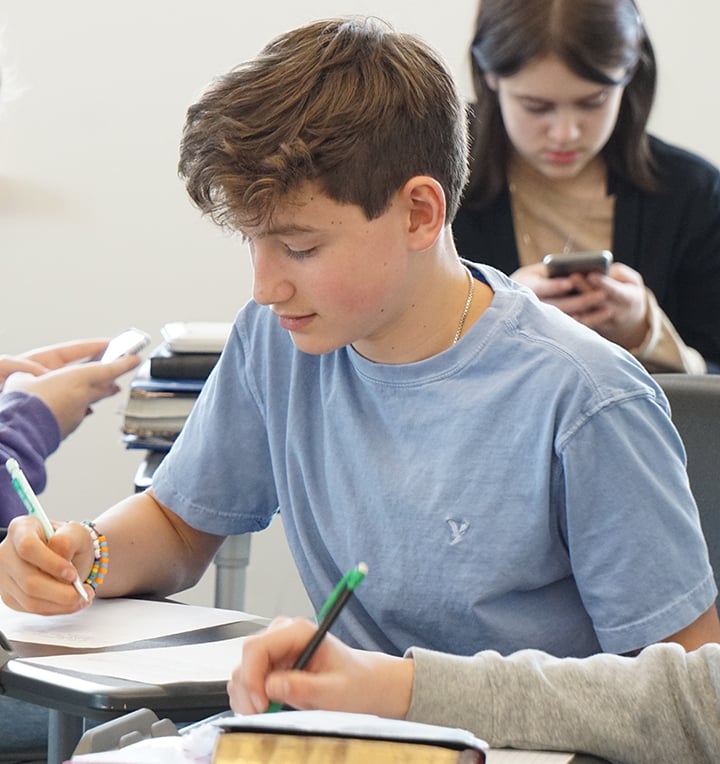Why Fostering a Passion for Lifelong Learning is Important at LuHi
The ability to learn—whether through discovering new things or by accepting lessons from our past—is one of the greatest gifts God has given humanity.
BY Hannah Buchholz
At Lutheran High School, learning is more than just a classroom experience—it’s a lifelong journey. We believe education is a gift from God, meant to equip students not just for college and careers, but for a lifetime of curiosity, growth, and service. Our goal is to instill a mindset that values learning as an ongoing process, shaping students into thoughtful, engaged individuals who glorify God by serving others with their minds and hands.
The Power of Asking Questions
“In school, we’re rewarded for having the answer, not for asking a good question,” noted Richard Wurman, author and founder of the TED Conference. But asking questions is a critical part of the learning process—one that too often fades as students grow older.
Preschoolers ask an average of 100 questions per day, but by middle school, that curiosity dramatically declines. Studies suggest this isn’t because kids lose interest; it’s because they stop asking questions. When curiosity diminishes, so does engagement and motivation.1
At LuHi, we believe asking good questions is just as important as knowing the right answers. That’s why Mr. Black, who teaches Lights Academy, focuses on helping students re-engage their question-asking habit. And once the habit is back, his class focuses on asking deeper, more meaningful questions.
Developing this habit is a life skill—one that extends far beyond high school. Knowing the right answers might earn an A on a test, but knowing the right questions to ask will take students much further in life.
What Defines a Lifelong Learner?
Lifelong learning doesn’t happen by accident—it’s a skill that must be nurtured. At LuHi, we encourage students to develop key traits that indicate a true passion for learning:
- Curiosity – Lifelong learners don’t just accept information; they ask thoughtful questions and seek deeper understanding. Curiosity is linked to higher academic achievement.2
- Observation – Learners stay aware of the world around them, reflect on their experiences, and look for ways to grow.
- Discernment – They don’t just absorb information—they critically evaluate it. In today's world, students are constantly exposed to new ideas, news, and differing opinions. At LuHi, we encourage students to develop Christ-centered discernment, which means wisely filtering information through a biblical worldview. These qualities create a foundation for critical thinking, adaptability, and a love for learning that extends far beyond high school.
How We Model Lifelong Learning
At LuHi, we take an intentional approach to fostering lifelong learning. Our teachers don’t just present information—they engage students in meaningful discussions, encourage deeper inquiry, and help them connect learning to real-world situations.
- Mentorship & Meaningful Conversations – Teachers take the time to build relationships with students, guiding them through discussions that challenge their thinking, encourage deeper reflection, and help them connect their learning to real-world experiences.
- Relevant & Evolving Curriculum – Faculty continually refine lessons to incorporate current events, cultural discussions, and practical applications.
- Engagement Beyond the Classroom – Learning doesn’t stop when the bell rings. Whether through extracurricular activities, service opportunities, or personal reflection, students are encouraged to explore and grow in all areas of life.
Beyond Grades: A Culture of Growth
While academic achievement is important, true learning isn’t measured solely by test scores or GPA. At LuHi, we emphasize a growth mindset—one that values curiosity, adaptability, and lifelong inquiry. By creating a culture where asking questions is encouraged, and intellectual curiosity is fostered, we equip students not just for their next academic step but for a lifetime of learning, leadership, and service.
1) Newsweek, The Creativity Crisis: https://www.newsweek.com/creativity-crisis-74665
2) The Hungry Mind: Intellectual Curiosity Is the Third Pillar of Academic Performance: https://journals.sagepub.com/doi/abs/10.1177/1745691611421204


.JPG.jpg)

